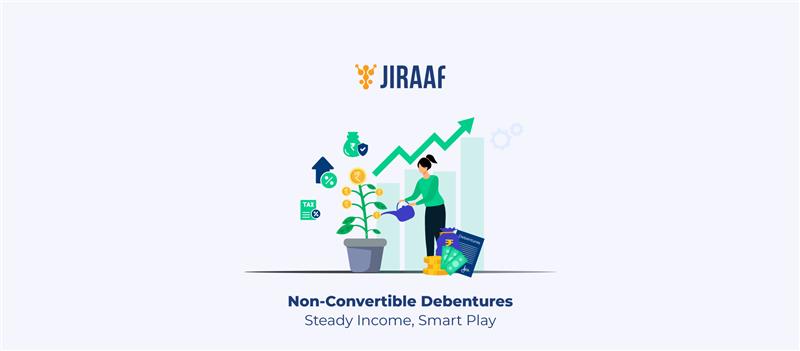The bond industry is growing in India due to the different roles that bonds can play in any investor portfolio. From offering money growth to mitigating risks and providing tax efficiency, bonds can be crucial in meeting any financial objective. There is a bond for every purpose and every investor.
This blog will explore bonds for every financial need, from capital preservation to capital growth, income generation, tax efficiency, and more.
What are Bonds and How Do They Work?
Bonds are financial instruments that organizations such as governments or companies use to secure funding for their operations or projects. When you purchase a bond, you are essentially lending money to the issuer in return for periodic interest payments (usually annual or semi-annual) and for full repayment of the bond’s principal amount upon maturity.
Bonds function similarly to loans. The issuer commits to paying a fixed interest rate (known as the “coupon“) over a specified term. At the end of the term (referred to as the “maturity date”), the issuer repays the original amount borrowed (called the “principal” or “face value”) to the investor. Bonds are generally considered safer investments compared to stocks because they provide consistent returns, making them an attractive option for investors seeking stable income at a lower risk.
Aligning Bonds with Your Financial Goals
As with any investment, it’s important to identify your objectives before choosing bonds to invest in. Let’s explore bonds according to different financial goals.
Goal: Capital Preservation
At one point in the financial journey, investors seek to safeguard their accumulated wealth. The emphasis shifts from seeking aggressive growth to security of existing wealth. Capital preservation focuses on minimizing the risk of capital loss and ensuring the long-term stability of investments. The objective is to select investment options that offer steady, albeit modest, returns while prioritizing the preservation of principal.
Who are These Bonds For?
If you’re a conservative investor nearing retirement or a big event for which you have saved a big corpus, bonds are a perfect choice for capital preservation.
Bonds You Might Want to Consider:
- Government of India Savings Bond: These bonds provide a stable investment option, offering fixed returns over a predetermined period. Investors can expect regular interest payments. The bonds are typically available for seven years from the date of issue, with interest paid every six months annually.
- State Government Bonds: These bonds offer lower but steady returns to investors. The income generated from these bonds typically comes in interest payments, and the principal is repaid at maturity.
These bonds are issued by highly secure institutions, and they aim to ensure that your principal is safe and offers a reliable, predictable income stream.
Goal: Capital Creation
When it comes to capital growth, equities are often the first choice. However, it’s important to remember that returns from equities often come with market volatility and may sometimes deliver compromised returns even in the long run. Capital creation through higher yield bonds helps you grow capital with market-competitive returns in a relatively predictable manner. The goal is to select bonds that create wealth that appreciates over the long term while balancing risk and return.
Who are These Bonds For?
If you are an investor with a long-term horizon and seek to build wealth steadily over time, capital creation bonds are well-suited for you. These bonds are typically best for those who can tolerate short-term volatility in pursuit of long-term growth.
Bonds You Might Want to Consider:
- Corporate Bonds: These bonds are issued by large, financially stable Indian companies with strong credit ratings. Corporate bonds typically offer better returns than government bonds but come with slightly higher risk due to the company’s creditworthiness.
- Debentures: These bonds are issued by companies and tend to offer higher yields compared to government bonds, making them an attractive option for investors looking to grow capital. However, they come with greater risk, especially with lower-rated companies.
Goal: Income Generation
Investors seeking a reliable, predictable cash flow from their investments look for an asset that can potentially provide regular payments. These regular payments serve as passive income.
Who are These Bonds For?
If you are an investor looking for a predictable cash flow on a period basis or passive income because you are a retiree or looking for a side income, you might want to consider bonds for income generation. These bonds offer you regular interest payments on a quarterly or monthly basis.
Bonds You Might Want to Consider:
- Fixed Deposits (FDs) with Government Backing: Though not technically bonds, government-backed FDs provide a similar fixed return and are a popular choice for income generation in India.
- Public Provident Fund (PPF): A long-term, government-backed investment tool, PPF offers steady returns, and the interest earned is tax-free, making it a reliable option for income generation.
- Corporate Bonds with Regular Coupon Payments: These bonds, issued by companies, pay out regular interest (coupons) and offer a consistent income stream for those who need predictable cash flow.
Goal: Tax Efficiency
Tax efficiency is often an important goal when it comes to creating a sound portfolio. Before picking any asset, you need to look at the effective returns after tax to make sure yours returns on point when it hits your pocket. The objective is to select investments that offer tax-free interest income or exemptions on capital gains while providing competing returns.
Who are These Bonds For?
If you are an investor looking for tax benefits and fall under a high tax bracket, aiming to reduce your overall tax burden, consider these bonds for tax efficiency.
Bonds You Might Want to Consider:
- Tax-free Bonds: Issued by government-backed enterprises such as the National Highways Authority of India (NHAI) in India, tax-free bonds provide a stable investment option, offering tax-free interest income. Investors can expect steady returns without worrying about tax deductions. These bonds are typically available for 10 to 20 years, with interest paid annually.
- National Savings Certificates (NSC): Backed by the government, NSCs are secure savings instruments that offer investment stability along with tax benefits under Section 80C of the Income Tax Act. Investors can expect returns with compounded interest, making them a reliable choice for tax-conscious individuals. NSCs have a five-year fixed maturity period, with interest reinvested until maturity.
Factors to Consider When Investing in Bonds
Once you have made up your mind about investing in bonds, it is essential to carefully evaluate various factors to ensure that the bonds you choose align with your investment goals, risk tolerance, and investment timeline. Here are some key considerations to keep in mind when selecting bonds for your portfolio:
a. Interest Rates
Bond prices are inversely related to interest rates. When interest rates rise, bond prices typically fall, and vice versa. Consider the current interest rate environment and potential future changes, especially if you’re investing in long-term bonds.
b. Credit Risk
Credit risk refers to the likelihood that the bond issuer may default on payments. Bonds issued by highly rated companies or governments (e.g., AAA) are less risky but offer lower yields. On the other hand, lower-rated bonds (e.g., junk bonds) carry a higher risk of default but may provide higher returns. Evaluate the issuer’s credit rating and ability to meet obligations before investing.
c. Maturity Risk
The maturity of a bond determines the time until the principal is repaid. Short-term bonds have less sensitivity to interest rate changes and lower risk, while long-term bonds offer potentially higher yields but come with greater interest rate risk. Consider your investment horizon and risk appetite when selecting a bond’s maturity.
d. Liquidity Risk
Liquidity measures how easily a bond can be bought or sold in the capital market. Highly liquid bonds, such as government securities, can be traded easily without significantly impacting their price. In contrast, corporate or municipal bonds may be harder to sell quickly. Consider your need for flexibility before committing to a bond investment.
Tools and Resources for Bond Investors
When it comes to investing in bonds in India, there are multiple platforms and tools such as bond directories available to help investors navigate the market, analyze options, and make informed decisions. However, two of the most important and widely used tools for Indian bond investors are the RBI Retail Direct Platform and the National Stock Exchange (NSE) India Debt Market. These platforms offer direct access to government and corporate bonds while providing transparency, ease of use, and reliable market data, making them essential for both novice and experienced investors.
RBI Retail Direct Platform
This platform, introduced by the Reserve Bank of India, allows individual investors to directly invest in government securities, treasury bills, and sovereign gold bonds (SGBs). It eliminates the need for intermediaries, providing a seamless way to access these safe investment options.
- Key Features:
- Direct access to government bonds with no brokerage fees
- Easy account opening and trading process
- Transparent and secure platform for retail investors
National Stock Exchange (NSE) India Debt Market
NSE India offers a platform to explore, compare, and invest in corporate bonds, municipal bonds, and government securities. It provides updated yield curves, bond prices, and trading volumes to help investors make informed decisions.
- Key Features:
- Access to a wide range of bonds, including AAA-rated and tax-free options
- Real-time data on bond prices and yields
- Transparency in bond market trading
The Bottom Line:
Bonds are a versatile investment tool for everyone, whether you’re looking to preserve your capital or create wealth, there’s a bond out there that fits your needs. Understanding which bonds align with your investment strategy can help you make more informed decisions.
As you explore the different types of bonds available in the Indian market, take the time to understand their features and how they can complement your investment strategy. While bonds can be an excellent addition to your portfolio, every investor’s condition is unique. It’s important to do your research, assess your goals, and consider seeking expert advice to ensure you make well-informed decisions that align with your financial objectives.
Discover fixed income investments with Jiraaf, a SEBI registered online bonds platform that educates and brings access to a wide array of bonds. Sign up today to explore diversified fixed income investment opportunities to support your goal-based wealth creation journey. Start investing!




